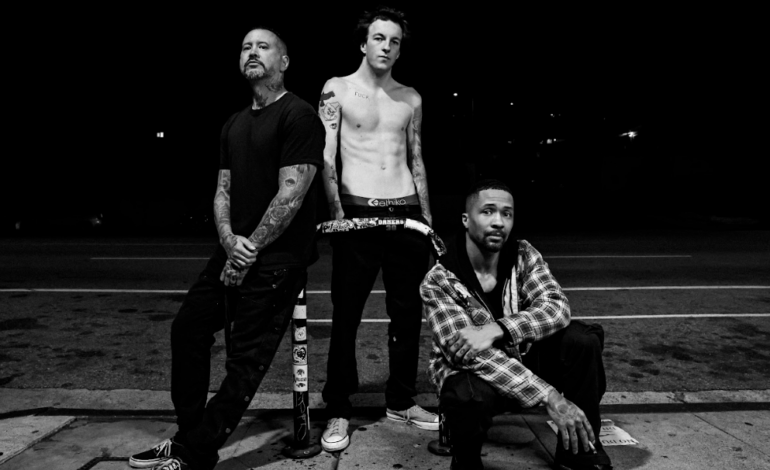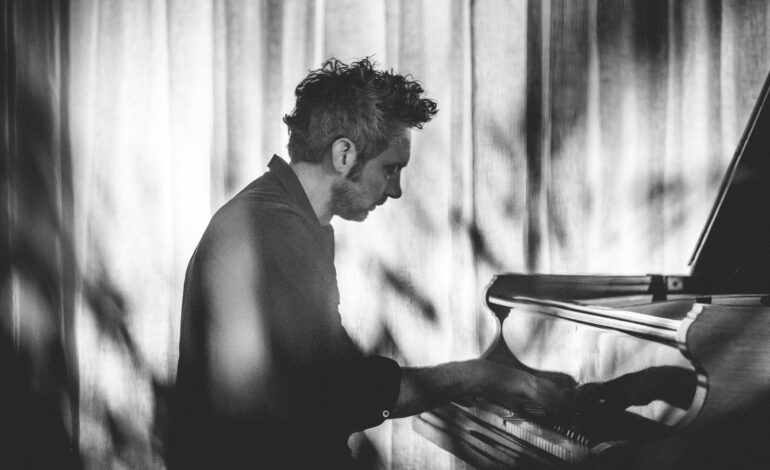Step into the charged world of Mutual Shock, the solo project of Seattle’s own Dan Powers, whose debut full-length album Nervous Systems is already making waves since its May 30 release. Following the acclaimed 2024 EP Stimulus Progression, Powers returns with a ten-track opus steeped in shadow and synth—a chilling yet seductive dive into alienation, anxiety, and existential drift in the digital age. Melding icy coldwave with the velvet hooks of synthpop and the grit of industrial, Nervous Systems is less an album than a psychic transmission: deeply felt, beautifully disquieting, and uncannily in tune with the emotional static of now. In this exclusive Urbansita Magazine interview, we talk with Powers about artistic survival, sonic catharsis, and why discomfort might just be our most honest muse.
Let’s start with the basics—what’s the origin story behind Mutual Shock?
Mutual Shock started as a vehicle for my interest in making a different type of music than what I’d been involved with previously. I was a guitarist and songwriter in a sort of garage punk band, with some post-punk influences, but always enjoyed the sounds of dark synthpop and Goth music from the 80s, and the revivals in the early 2010s. I got my first hardware synthesizer in 2021 and started tinkering with writing these kinds of tracks in the next couple of years, and by 2023 I was fully hooked on the sounds of acts like Molchat Doma and Boy Harsher and Twin Tribes and actively trying to figure out how I could blend those influences with my own voice and other interests, like John Carpenter’s film scores. The name just sort of came up when my partner and I were chatting, and it felt like it fit.
Nervous Systems has such a specific mood. What was your headspace like during the writing and recording of the album?
Most of these songs were written from spring 2024 to the beginning of this year. In my personal life some things have stabilized after a big period of change, and this was a chance to reflect back, while also dealing with some of my persistent mental health challenges with depression/anxiety, as well as this heightened feeling that humanity is on this sort of knife’s edge between having the tools to solve lots of our enduring problems and make a better, kinder, more sustainable world, but not having the willpower, and having plenty of people in political or corporate power actively working against those aims.
The album title is loaded. Why Nervous Systems? What does that phrase mean to you?
On the album vs. the EP that I released last spring, I’ve tried to deal a little more directly with my brain chemistry and how it influences my view of the world, and honestly, just how I cope with it. So “Nervous Systems” here is pretty literal, with three meanings – the central nervous system (the brain) is on edge (mine in particular), and so are institutions and parts of the fabric of society that, if they were really functioning well, would probably make it much more difficult for authoritarians around the globe (including in the U.S.) to take power, for tech companies to hoover up our data and blatantly steal from artists, for the Feds to disappear people, all these horrible things that are happening today.
How did making Nervous Systems compare to working on your EP Stimulus Progression? What changed in your process?
I think I understood some existing gear more deeply on this record, particularly the Roland System 8 that is my workhorse for a lot of classic 80s Juno and Jupiter tones, and I also added their SE-02 to my workflow, which can create lots of gritty and dissonant textures that I really love, and that I think led me toward the more driving sounds on the title track, Destroyer and Body Together. I tried to loosen up more on the writing and recording here, too, so instead of having as much of a template/workflow, to have a vision for each track and chart out how I’d get there.
You’ve cited influences like Black Marble and Nine Inch Nails—what is it about those artists that resonates with you?
Black Marble uses relatively simple and understated synths and drum machines to create such beautiful music. Chris Stewart writes wonderfully hooky melodies and I think has such a great vocal delivery, that’s both detached but has a real warmth to it. So that ethos inspires me when I’m trying to make something beautiful. And NIN is a relatively more recent obsession for me, particularly Pretty Hate Machine and The Downward Spiral, along with Reznor/Ross’s work as a film scoring duo on The Watchmen, Challengers, etc. I love the way Reznor builds his songs around pulses that can either be very driving and danceable or lurching and sensuous, and of course he’s a singular figure in the way he sings, what he sings about (greed and corruption and hypocrisy), and his incisive approach to that type of subject matter allowed me to think differently about my lyrics and POV on songs like Destroyer and Bore Me.
There’s a strong visual identity to Mutual Shock. How involved are you in crafting the artwork and overall aesthetic?
I’ve gotten to work with some wonderful artists to shape the visual identity – Keith Stein and Brittne Lunniss for my portraits helped capture the nighttime vibe, and Diego Andrade has been my go-to for both the EP and album covers and most of the singles. He’s an incredible illustrator and he’s steeped in lots of different traditions – fantasy/sci-fi art, anime/manga, comic books – so I’ll usually give him an idea of the themes I’m trying to express and share the music and he’ll create some sketches and we’ll go from there. The logo was also great fun to work on, with Sierra Jones. And I’d be remiss if I didn’t mention the music video for Destroyer, which I’m very proud of – Caleb Young of Handcrank Films, and our DP Dakota Huntley, pulled off an amazing, claustrophobic, Fincheresque kind of short film in the song’s 3 minute runtime that really capture the buzzing unease of the track. I’ve been really fortunate to get to build this kind of moody, dark, dystopian aesthetic that hopefully people can relate to and makes listeners/viewers want to go down the rabbit hole with me.
A lot of your music explores feelings of alienation. Are those themes coming from personal experience, or more of a commentary on the world around you?
A bit of both – I think as I get older, I’ve gotten into healthier personal relationships, and been able to mend/repair some where I had grown distant. But not everything can be repaired, which is I think a hard truth of life.
What’s your typical songwriting process—do you start with lyrics, a beat, a mood?
It really varies – I keep a notebook of lyric ideas, both themes and specific lines that I might want to use, and I’m a heavy user of Voice Memos to record beats or riffs or vocal melodies that grab me. Lots of those come to me when I’m moving, walking or in the car, and some of the best enter my brain right as I’m drifting toward sleep or waking up. I’ve built a little looping setup with guitar, bass, synths, drum machine through a mixer that lets me experiment pretty quickly with building up the layers of a track, and I’ll usually jam for a while to see if something hooks me, record that jam as a voice memo, and listen back later. If I’m still feeling it, I’ll develop it, and if not, I’ll move on to something else. Every now and again, I’ll also just sit down to a totally blank slate and noodle on guitar or bass or synth until I find something I like. Having a process has been really critical for me, because inspiration doesn’t always come when you want it to.
Seattle’s music scene has so many different currents. Do you feel connected to any particular corner of it, or do you feel a bit outside of that?
There are so many incredible musicians in Seattle; it’s a really fun time to be here. There’s a particularly great dark music scene here, and so many talented electronic acts making great darkwave and EBM and new wave and post-punk. I don’t know if I fit into any one category particularly well, but that has made it a fun experiment to see which bills I can fit on. I was really honoured to participate in Seattle’s first Midnight Fest, which hometown heroes Midnight High put on at Baba Yaga. The energy was amazing, and there were great Seattle acts that I admire, like Ghost Fetish and Dark Chisme, but also from all over the PNW, and even abroad.
What’s next for Mutual Shock? Are you already working on new material, or are you giving this album time to breathe?
I’m pretty much always working on new material, so I’m beginning to curate a list of songs that might be up next for a single or two this fall. I plan to keep pushing the album and playing songs from it live, though. I’m really proud of it.
INSTAGRAM | FACEBOOK | YOUTUBE | WEBSITE | BANDCAMP | SPOTIFY


